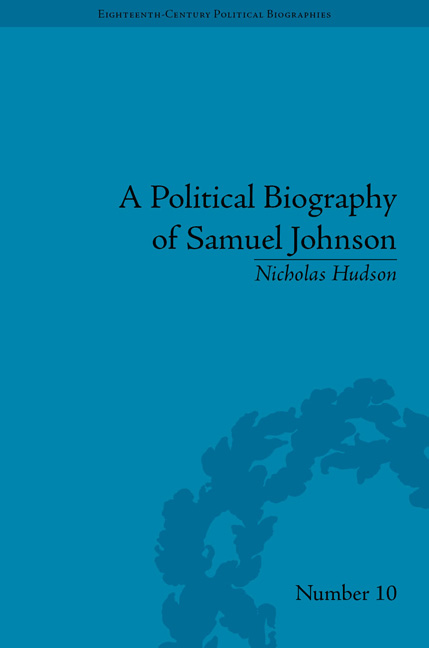Book contents
- Frontmatter
- CONTENTS
- Dedication
- Acknowledgements
- Note on the Text
- Introduction
- 1 Political Origins, 1709–36
- 2 The Patriot Opposition, 1737–9
- 3 An Independent Voice, 1740–55
- 4 The Seven Years War, 1756–63
- 5 Defender of King and State, 1763–70
- 6 Troubles of Empire, 1771–84
- Conclusion
- Notes
- Works Cited
- Index
3 - An Independent Voice, 1740–55
- Frontmatter
- CONTENTS
- Dedication
- Acknowledgements
- Note on the Text
- Introduction
- 1 Political Origins, 1709–36
- 2 The Patriot Opposition, 1737–9
- 3 An Independent Voice, 1740–55
- 4 The Seven Years War, 1756–63
- 5 Defender of King and State, 1763–70
- 6 Troubles of Empire, 1771–84
- Conclusion
- Notes
- Works Cited
- Index
Summary
Debates in the Senate of Lilliput
Johnson's early writings in London indicate considerable dismay with the corruption and disorder of the capital. The experiment had also failed to secure him a steady income and evidently placed a strain on his marriage. In August 1739 he left for the Midlands without Tetty to apply personally for the position of master in Appleby, about a dozen miles from Lichfield, and would not return until the following spring. He had nonetheless impressed some important people. Alexander Pope had been so struck by ‘London’ that, unknown to Johnson, he wrote to the dominant politician in Staffordshire, the Tory Lord Gower, asking him to support Johnson's application to Appleby School. Additionally encouraged by Johnson's very high reputation for scholarship in the area, Gower wrote to a friend of Jonathan Swift wondering if the Dean of St Patrick's would arrange for an honorary MA from Trinity College. When nothing came of this application, Johnson returned to London to find Edward Cave eager to give him advanced responsibilities at the Gentleman's Magazine.
Johnson did not come back to rejoin the political battle that he had previously viewed with scepticism. His contributions to the magazine in the early 1740s included his first piece of literary criticism, ‘An Essay on Epitaphs’ (1740) and entirely non-political biographies of Barratier and Sydenham.
- Type
- Chapter
- Information
- A Political Biography of Samuel Johnson , pp. 57 - 88Publisher: Pickering & ChattoFirst published in: 2014



